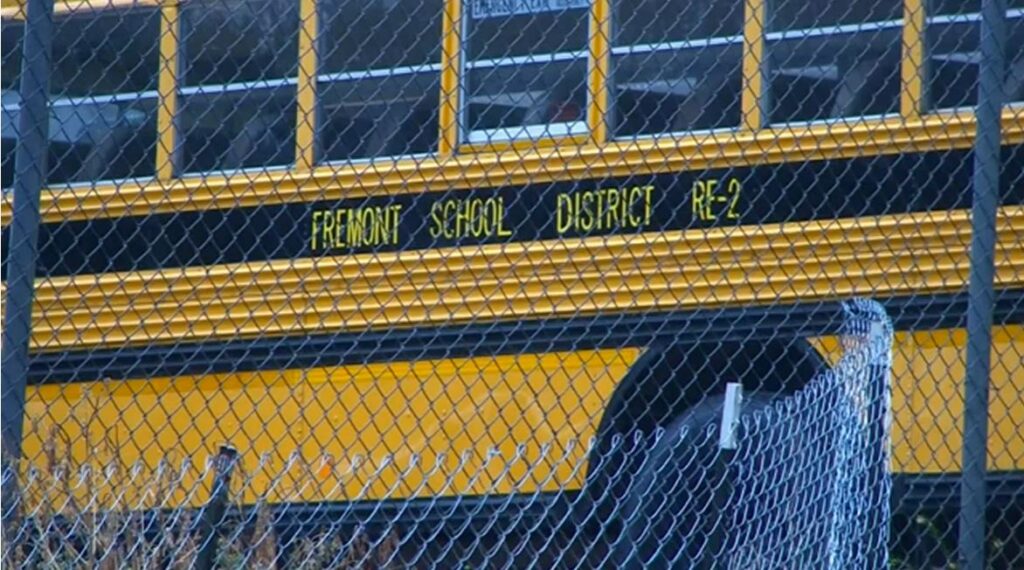By Jeffrey A. Roberts
CFOIC Executive Director
Purposely blurred to protect children from being identified, the school bus surveillance video is still shocking to watch. The driver leans over a bench seat and apparently tries to push up the mask of an elementary school student. Moments later, he is seen slapping the 10-year-old girl’s face.
Without the video, the story that aired Monday night on KKTV 11 News in Colorado Springs wouldn’t be nearly as powerful.
But reporter Ashley Franco had to fight for the footage as well as investigative and disciplinary records related to the April 12 incident, both of which were initially withheld by the Fremont School District in response to her Colorado Open Records Act (CORA) requests.
In an April 23 email to Franco, Superintendent Brenda Krage cited the federal Family Educational Rights and Privacy Act (FERPA) to deny her request for the school bus video. Krage cited CORA’s “personnel files” exception to deny Franco’s other request for records about the bus driver’s leave and the district’s investigation.
Court rulings, however, do not support the basis for either of the district’s denials.
Media attorney Steve Zansberg asked Krage to reconsider her response to Franco in an April 29 letter, which also notified the district that KKTV was prepared to go to court if necessary.
Zansberg, who is president of the Colorado Freedom of Information Coalition, wrote that courts around the country have repeatedly held that video recordings used in the context of disciplining school district employees are not protected “education records” under FERPA because they are not directly related to any individual student’s educational experience.
“If the very purpose of the recording is security and safety, then the video recording is not an education record …,” explained the authors of a 2018 paper for the University of Massachusetts School of Law. FERPA, they concluded, “is all too often misconstrued or perverted to preclude the disclosure of video recordings that capture students victimized by violent crime or tortious injury. This misuse of federal law impedes transparency and accountability and, in many cases, even jeopardizes the health, safety, and lives of children.”
Even if the school bus surveillance video were an education record subject to FERPA, federal regulations authorize schools to release records or information without someone’s consent when personally identifiable information has been removed, Zansberg wrote. He cited Colorado court rulings directing records custodians to redact confidential information from records so that non-exempt information can be disclosed, and he noted that the Pennsylvania Supreme Court last year ordered a school district to release a school bus surveillance video with the students’ faces blurred.
Regarding the Fremont bus driver’s disciplinary records and the school district’s investigative report, Zansberg pointed out that CORA’s “personnel files” exception applies only to “personal demographic information” such as a public employee’s home address, telephone number and personal financial information. The Colorado Court of Appeals said so in Daniels v. City of Commerce City and in Jefferson County Education Association v. Jefferson County School District.
Additionally, an Arapahoe County District Court judge in 2016 ruled that complaints and disciplinary actions against public school bus drivers are not “personnel” records that must be kept confidential.
An attorney with Caplan & Earnest, a Boulder-based law firm that represents the Fremont district and many other school districts in Colorado, responded to Zansberg’s letter by writing, “The District intends to cooperate with you and to respond to your request, as appropriate.”
Franco obtained the blurred video as well as records showing that the district put the bus driver on paid administrative leave before he resigned. Other documents detailed the incident and included an admission by the driver that he “slapped (the girl) once.” According to KKTV, the driver faces misdemeanor charges of harassment, assault causing injury and child abuse.
Follow the Colorado Freedom of Information Coalition on Twitter @CoFOIC. Like CFOIC’s Facebook page. Do you appreciate the information and resources provided by CFOIC? Please consider making a tax-deductible donation.





